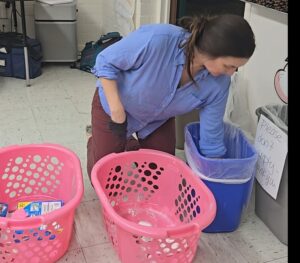Guest Post by Elizabeth Meshes, PhD, BCBA-D
The Chicago School (EMeshes@thechicagoschool.edu)
Past-President of Behavior Analysis for Sustainable Societies: https://baforsustainablesocieties.org/
LinkedIn: https://www.linkedin.com/in/elizabeth-meshes-a1685144
https://www.thechicagoschool.edu/academics/faculty/byname/elizabeth_meshes/
Author’s Note: I am a Board Certified Behavior Analyst, Associate Professor, and Community Advocate dedicated to advancing behavioral solutions to environmental sustainability. I work to apply behavior science to sustainability efforts, including waste-diversion research and food-waste reduction strategies. My scholarship emphasizes the practical role of behavior analysis in addressing pro-environmental behavior. The views expressed here are my own, and I used AI tools to help refine the writing.
When we talk about sustainability, it often defaults to “Someone needs to do something. This problem is bigger than me. What difference can I make?” Mistakenly, it seems that change is only possible at the level of sweeping policy reform, new technologies, and system-wide change. All these things need to happen, but they do not happen in isolation. Since the Paris Agreement, there has been policy adoption and increased support for climate action, but there is a large gap between intention and action (Paris Agreement After 10 Years, 2025). Large-scale shifts are built on countless individual behaviors-small, repeated choices that accumulate across people, settings, and time.

Photo by Elizabeth Meshes
Every action you take has an environmental impact. Each time you choose the option that produces less harm—repurposing rather than throwing away, composting instead of landfilling, walking rather than driving—you shift the contingencies shaping both your own behavior and the behavior of others.
Harm Reduction Is Action
Individuals are frozen in inaction because they believe that only big changes “count,” but sustainability is not an all-or-nothing proposition. We change the world the same way we change behavior through shaping and reinforcing small, achievable shifts towards terminal behavior. Choosing the more environmentally friendly option—even if it is not the perfect option—is progress, and progress matters!
Your Behavior Is a Signal to Others
Culture matters. The behavior of the group is culture, and you, as part of that group, make a difference. We shift cultural contingencies by changing our behavior in the groups we belong to. Research has repeatedly demonstrated that modeling is a powerful mechanism for influencing behavior (e.g., Sussman et al., 2013; Sussman & Green, 2013). Model what you want to see. When others observe you engaging in sustainable actions, you are not simply “doing your part.” You are changing the discriminative stimuli in their environment. Your behavior shifts the culture to make sustainable action normal, expected, and possible.

Photo by Brett Sayles
So, Choose the Better Option
You do not have to be perfect. You do not need to overhaul your life to the pre-industrial revolution. You only need to choose the action that produces a little less harm, a little less waste, a little more sustainability. Your choices matter. Your behavior has a cumulative impact. You influence others. Your behavior changes your immediate and existential environment. And what you are doing—right now, today—really does make a difference.
************************************************************************************************
Please join us[EM1] at Behavior Analysis for Sustainable Societies [EM2] and let us know what you are doing, big and small.
References
Paris Agreement after 10 years. (2025) Nature Climate Change 15, 1124. https://doi.org/10.1038/s41558-025-02473-0
Sussman, R., & Gifford, R. (2013). Be the change you want to see: Modeling food composting in public places. Environment and Behavior, 45(3), 323-343. https://doi.org/10.1177/0013916511431274
Sussman, R., Greeno, M., Gifford, R., & Scannell, L. (2013). The effectiveness of models and prompts on waste diversion: a field experiment on composting by cafeteria patrons. Journal of Applied Social Psychology, 43(1), 24-34. https://doi.org/10.1111/j.1559-1816.2012.00978.x
[EM1]https://www.eventbrite.com/e/bass-community-meetings-tickets-1405116644709
